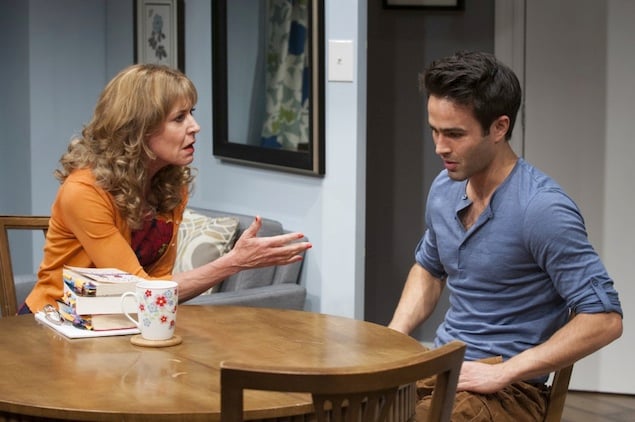
In his dark, unflattering portrait of narcissistic millennials, Really Really, then-26-year-old playwright Paul Downs Colaizzo skewered a generation with all the precision of one embedded in it. His sophomore effort, Pride in the Falls of Autrey Mill—currently playing in a world premiere production at Signature Theatre—takes a similarly unromantic look at suburbia and the fissures beneath the glossy, picture-perfect lives of country clubs, swimming pools, and “roman columns in every entryway,” as our heroine, stay-at-home mom Carly (Christine Lahti) glowingly puts it. Maybe it’s the subject matter, or maybe it’s the fact that watching lives unravel within the space of 90 minutes is a staple of American theater, but Colaizzo’s sophomore play never quite finds its true depth.
This is despite the fact that it has a memorable star in Lahti, whose Carly is wound so tight when the play begins that it’s a wonder sparks don’t start flying out of her head. The show also benefits from Michael Kahn’s direction, and from compelling supporting performances by Wayne Duvall as Carly’s entirely disinterested husband and Anthony Bowden and Christopher McFarland as her dysfunctional sons. The stage in Signature’s 110-seat Ark Theatre is a little too small to convey the gaping loneliness of a suburban McMansion, but Lahti spins about the space nonetheless, frenetically washing lettuce, plumping pillows, and indulging in the kind of high-pressure parenting that would drive any child to doobies and despair.
The play opens with Carly in uncharacteristic silence, attempting to find an appropriate response to the news that Chad (Bowden, who’s enjoyably loathsome) is gay. Then follows the bombshell that Tommy (McFarland) would rather pursue his career waiting tables at Rowdy Randy’s than continue with law school. Carly (who, it transpires, takes extreme measures to maintain her beauty-queen physique) scoffs at her son’s weight problems and makes snide remarks about a neighbor’s fat daughters before obsessing over the divorce of a friend who lives nearby, retiring to the safe space of her closet to conduct phone calls and insist over and over to anyone who’ll listen how perfect her family is.
This might be fertile territory, despite the fact that Autrey Mills could be Stepford, or Seahaven, or any of the other seemingly idyllic enclaves that end up being rotten to the core. Carly could even be an older version of Leigh from Really Really—she also grew up poor, and clawed her way to the generic symbols of wealth and respectability that Colaizzo continually pokes holes in. But the plot feels unoriginal at times and contrived at others—it borrows not one but two moments from Sex and the City. Carly describes putting pictures of her face on the mobile that hung over her son’s crib, and almost spontaneously combusts over the stress of getting her family together for a photo of her prize-winning floral arrangement that’s running in the local newsletter.
There’s a dark dynamic between Carly’s two sons that seems designed to shock rather than illuminate, and Louie doesn’t have the depth to him that Duvall’s thoughtful performance deserves. Lahti is remarkable as Carly, particularly in the second act as the character stops being polite and starts getting real, to borrow an overused MTV catchphrase, and the set by James Noone uses the space ingeniously, pulling rooms out of walls and creating a house that’s both homey and magnificently artificial. Colaizzo’s awful characters are certainly fun to watch, and his acerbic view of middle-class pretension is definitely refreshing. Autrey Mill is just a landscape we’re unfortunately all too familiar with.
Pride in the Falls of Autrey Mill is at Signature Theatre through December 8. Running time is about one hour and 45 minutes, including one intermission. Tickets ($40 to $94) are available via Signature’s website.
















